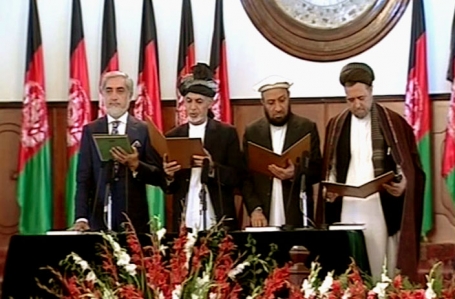
Under their negotiated agreement made earlier this month, President Ashraf Ghani Ahmadzai and Chief Executive Abdullah Abdullah, having been sworn into office, now face the challenge of leading the country as partners.
Although all political, security, economic, and social governance related decision-making will be influenced by the formal rivals respectively, President Ghani has emphasized that their national unity deal does not mean power sharing. “A national unity government is needed in Afghanistan, it does not mean power sharing, but its purpose is to serve the people and is to share duties,” he said.
Based on the agreement, President Ghani will be leading monthly cabinet meetings and make decisions on major international issues. Meanwhile, the CEO will lead the weekly cabinet meetings. And when it comes to appointments, the two men will have equal say.
“We are committed to the national unity government as a united team, based on the agreed political framework,” Abdullah said on Monday. "The purpose of the unity government is to bring fundamental changes and bring changes to all political and administrative parts of the country.”
Former President Hamid Karzai has also committed to supporting the national unity government and the partnership between the two men. The former president was integral to negotiations that ultimately helped settle the disputes between Ghani and Abdullah during the election process. “As I have said many times, I will be cooperative with both President Ghani and CEO Abdullah Abdullah,” Karzai said.
Based on documents received by TOLOnews, appointment powers under the national unity deal are as follows:
Ministers of Interior and Tribal Affairs and the Director of the National Directorate of Security will be appointed by the President, while the Ministers of Defense, Foreign Affairs, Border and Counter Narcotics will be appointed by Abdullah Abdullah. The National Security Advisor will then be appointed by the president, and members of his council will be appointed by the CEO.
Economic and financial areas have also been equally divided between the president and CEO. The Ministers of Finance, Energy and Water, Public Works, IT and Communication, Rural Rehabilitation and Development and the Governor of the Afghan Central Bank will be appointed by the president. The Ministers of Economy, Urban Development Affairs and Housing, Mines and Petroleum, Trade, Transport and Aviation, as well as Deputy Ministers of Customs will be appointed by Abdullah Abdullah.
For social matters, the Ministers of Education, Health, Labour, Social Affairs, Martyrs and the Disabled will be appointed by Abdullah Abdullah, while Ministers of Higher Education, Refugees and Repatriations will be appointed by President Ghani.
The Ministers of Justice, Information and Culture and Chairman of the Commission on Implementation of the Constitution, and High Office of Anti-Corruption will be appointed by President Ghani. The Minister of Hajj and Religious Affairs will be appointed by Abdullah.
The remaining ministries of the government have also been divided between president and CEO, and sources close to the men indicate that a few new ministries could be created.
The distinction between “national unity” and “power-sharing” has been one that many have harped on, avoiding the belittling of Ghani’s authority as president. “If this government is formed based on the true will to serve the people of Afghanistan, and people can see themselves with a government of national unity, rather than the sharing of power,” Kabul University professor Wadeer Safi said.
Of the 25 ministries, 12 ministries have been given to Abdullah and 13 to President Ghani. In return for having one less ministry, Abdullah has taken a number of key directorates.



